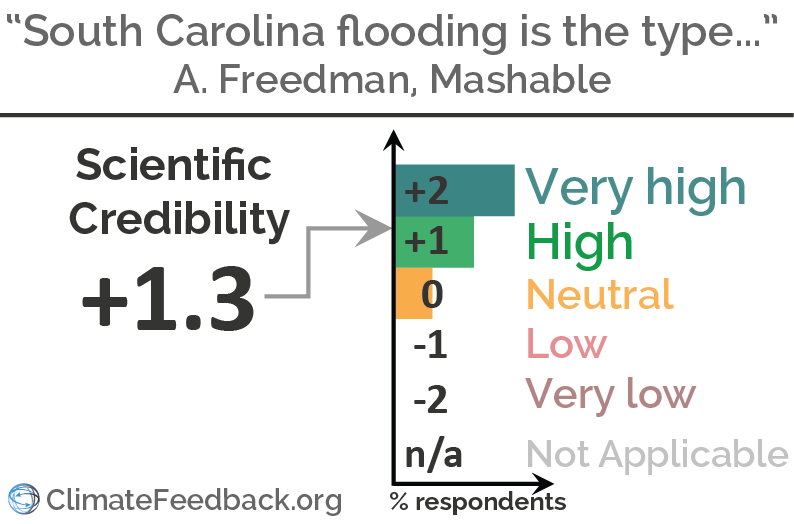- Climate
Analysis of “South Carolina flooding is the type of event climate scientists have warned about for years”
Reviewed content

Published in Mashable, by Andrew Freedman, on 2015-10-06.

Scientists’ Feedback
SUMMARY
This Mashable article does a good job at describing the relationship between the flooding in South Carolina and climate change. Long-term trends show an increase in the frequency of heavy downpours in the US, and this increase is consistent with the consequences of climate change. There is still debate, however, over attributing specific extreme rain events to climate change. Some scientists argue that by increasing the amount of moisture in the atmosphere, global warming has an impact on all extreme rain events. Not all scientists agree with this conclusion, however, and Andrew Freedman makes this clear in his article.
See all the scientists’ annotations in context
GUEST COMMENTS
Thomas Mote, Professor, Department of Geography, University of Georgia
I believe the article addresses our current understanding of the science and is a balanced response.
The article discussed the unique juxtaposition of an upper-level low and hurricane that was the direct cause of the event, but also directly addresses the role of the increase in atmospheric water vapor available for enhancing rainfall. The article also discusses the potential role of high latitude blocking highs (such as occurred with Hurricane Sandy), but, appropriately, does not dwell on that as a leading mechanism. I also appreciate the different perspectives on attribution studies and how they might apply to this situation.
Note:
For the reader interested in further analysis about the influence of climate change on South Carolina flooding, Dr. J. Marshall Shepherd (Professor at the University of Georgia) recommends the article by Chris Mooney in the Washington Post. Dr. Shepherd says, “It pretty much sums up what I would say about South Carolina flooding and climate change.”
REVIEWERS’ OVERALL FEEDBACK
These comments are the overall opinion of scientists on the article, they are substantiated by their knowledge in the field and by the content of the analysis in the annotations on the article.

Associate Professor, University of Washington
Water vapor content has increased in a warmer climate, and this is leading to more extreme rainfall events around the world. It’s tricky to evaluate the contribution of climate change to a particular weather event, but generally speaking, the author provides an accurate summary of the challenges of this research, and the range of scientific thinking about it.

Scientist, University of Bonn, Germany
This is a complicated topic and the author honestly describes many caveats. Still the reader may get the impression that the changes in precipitation are larger than they most likely are.

Research Scientist, NOAA's Center for Weather and Climate
The statements and quotes are defensible but also vague and quite broad in how one thing may be related to another. Consequently, the article does not provide much scientific insight. The lack of specificity in “connecting the dots” leads to a somewhat unsubstantial message.

Research Associate, Harvard University
In my view this article presents a well-documented and balanced view of what can, or cannot, be said currently about extreme precipitation events and global warming in general, and about this recent event in South Carolina in particular. I appreciate the author’s effort to get the input of several climate scientists on the latter.

Climate Scientist, Environmental Defense Fund
Comprehensive overview of the state of the science, including discussion of areas we know well and areas that are still being actively researched.
Notes:
[1] See the rating guidelines used for article evaluations.
[2] Each evaluation is independent. Scientists’ comments are all published at the same time.



